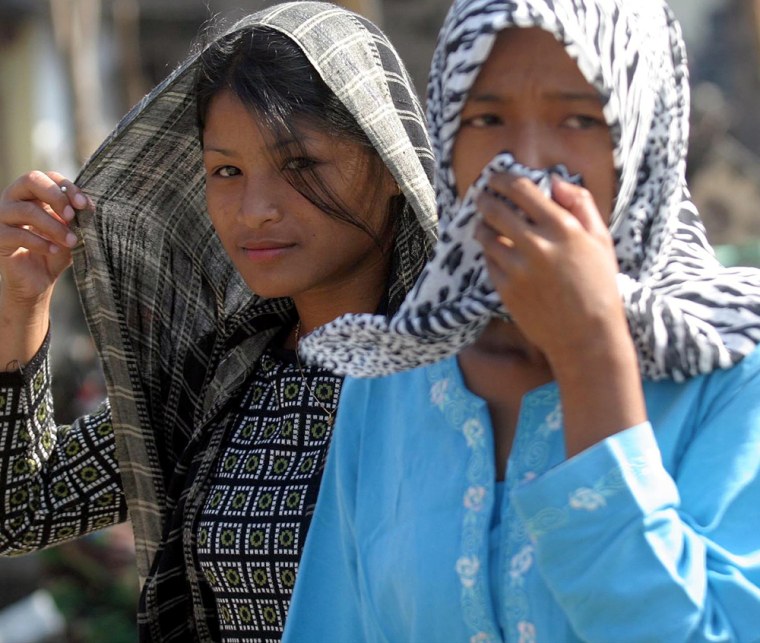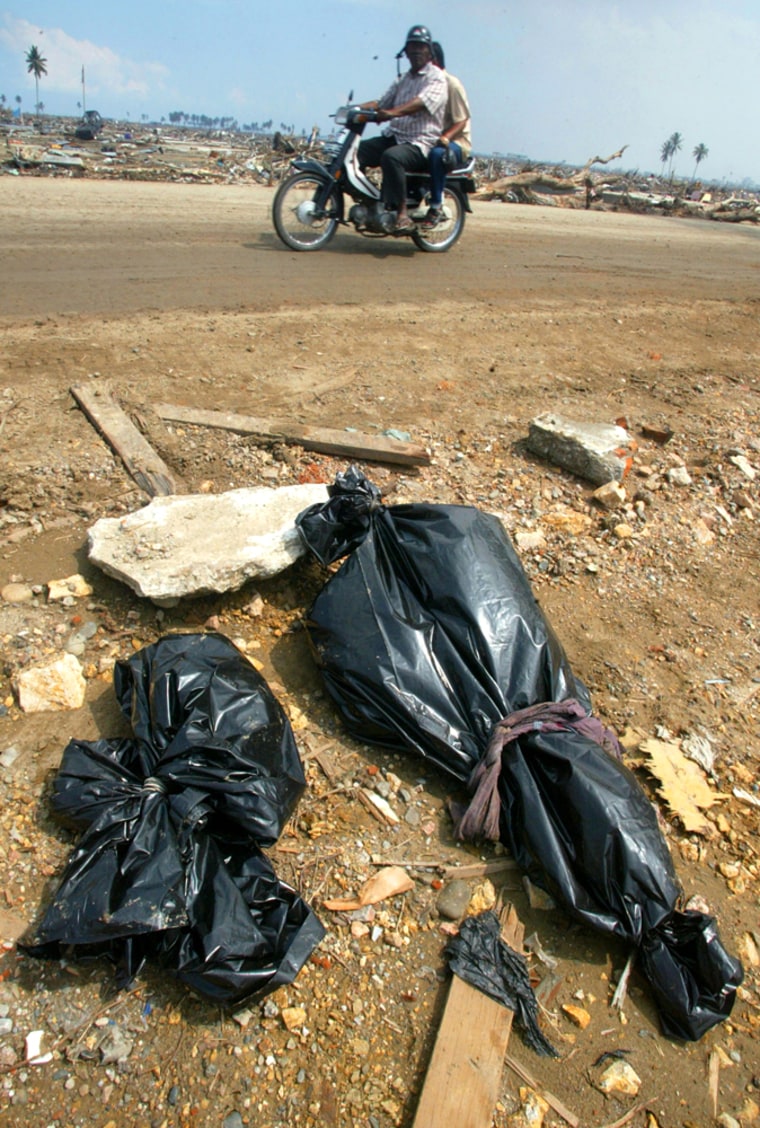We rode our motorbikes — my 17-year-old translator Mohammed and I — as far as we could down a rutted, muddy path to the village of Darussalam. We could see a fire a little way ahead and stopped at a swampy opening of palm trees. Two brothers, in their early twenties, were sifting through the remains of a house about 20 yards across the water from us.
“We’re looking for our parents,” one of them one said, before slipping off a downed tree trunk into the muck up to his waist. The others laughed. It seemed a welcome sound, if out of place, in the ghoulish setting.
Seeing a flat, smoky fire nearby I asked what it was. “A body, but not someone they recognize,” said Mohammed.
We rode further down the trail, careful not to run over the many black body bags that lined both sides. As we passed, a brownish-yellow foot stuck out of the end of one.
“Ughhh,” said Mohammed, veering the bike away at the last minute.
Despite being in the epicenter of this disaster, he had never even seen a dead body until we had walked through the city’s devastated marina area.
His family’s home was near the hills and had been spared by the tsunami.
Seeing bodies was something he had hoped to avoid, even though now they surround him and every other survivor in Banda Aceh, a great army of corpses that can't be wished away.
Making it human
A woman named Rumainur spun around on a slab of concrete crying, “Allah, Allah.” It was the place her house once stood before the tsunami. Her 16-year-old son Azhari stood nearby, arms crossed. He was confused and angry, unable to believe that fate had taken not just his family’s home but also his older brother.
There was destruction for as far as the eye could see — just one great plain of splinters, crumbled brick and the possessions that the dead had left behind: a pair of jeans laid out in the dirt almost as if the owner disappeared while wearing them, a brightly-colored dress still on a hangar, perhaps a mother’s favorite, and a cracked motorbike helmet. Was it worn by a driver trying to outrun the tsunami?
Mohammed picked up a photo album. It was covered with mud — the pictures inside ruined. All the years of memories destroyed like the lives they depicted.

The Indonesian soldiers who were recovering bodies had run out of latex gloves. They improvised by tying black plastic bags around their hands to do mortuary work on a scale they likely never dreamed of.
Near a bridge, one soldier found a poster of pop songstress Avril Lavigne. He saw me shooting video and held it up to be photographed, laughing. It went into his take-home pile. The other soldiers asked me for cigarettes, anything to dilute the stench of rotting corpses.
The smell is probably hard-wired into our cognitive memory the way a cow can sniff its own mortality at a slaughterhouse. It is a smell unique to itself in its repulsiveness, a combination of rotting cabbage and meat and that sickly-sad smell of the geriatric ward.
I gave the soldiers my last three menthols.
As we walked on, we passed four bodies bags with a handwritten sign in front of them. “It says,” Mohammed read, “that the bodies in these bags are all from one family, father, mother, daughter and a baby,” as he pointed to what looks no bigger than a kitchen trash pail liner.
Hope itself
Mohammed’s own family, as every other in Banda Aceh, has been touched by the tragedy. His aunt and uncle’s home was swept away by the tsunami — and likely all three of their young sons with it.
His aunt and uncle, Usman and Dina, were distraught, holding up what may be the only proof that the boys ever lived — digital photographs stored on a mobile telephone.
They grasped the phone as if it were hope itself, something, like so many others here, they are unwilling to let go of yet.
In the same room Mohammed’s 9-year old nephew, also named Mohammed, lay on the floor watching television. His parents, both doctors, were missing and presumed dead. He survived by hanging on to a floating plank until a fishing boat plucked him from the sea.
When photos of his father and mother were placed on the rug next to him — he just stares at them blankly.
Last best chance
In the children’s ward of a converted military hospital in Banda Aceh, Azwan sang the Quran to his infant son.
Since the tsunami, in which the boy was nearly swept away like so many others, he has suffered from fever and diarrhea. Medicine helps, but only his Azwan’s singing stops the tears.
There are dozens of other child survivors here. And while the disaster did not take their lives, it did take a part of them.
Seven-year-old Delisa was playing on the beach when the tsunami struck. A passing boat plucked her from the water, but only after her leg had been crushed by a wooden beam.
It had to be amputated. She is beautiful girl with an elfin smile and dark brown eyes. She playfully rotates her stump from under her nightshirt while eating a bowl of noodles.
But when it came time to change her dressing, the pain caused her to cry out uncontrollably. It is a difficult sound for anyone to hear, let alone her mother, who has sat day after day by her bedside.
Nearby, with his father’s help seven-year old Feri walked back to his bed. He is a scarecrow of a boy, each step as hesitant and painful as if he were walking on glass. Medical equipment is so scarce his IV bottle is tied to the window shade.
“He is all I have left,” said his father, Saiful, a 40-year old bus driver. “My wife and two other children are all dead.”
Feri was suffering from pneumonia — he moaned in a withering delirium. Saiful looked at him lovingly, drawing his hand across the boy’s forehead, trying to stroke his pain away.
Each parent and child here has suffered terrible loss — physical and psychological trauma that could remain the rest of their lives.
But here in this place where their futures seem so uncertain — they cling to each other as their last best chance.
No tent
Ibnu Jarir had no tent, so the 28-year old fisherman had to make one. And in this crowded refugee camp, in the shadow of a silver mosque, on the outskirts of the city, 15 people will take shelter under it. Ibnu lost his wife to the tsunami and said very little while he worked.
He busied himself cutting and stretching black plastic sheets over a small plot of ground that will be their only protection from the winter rains. He was skillful in laying out the shelter, pulling the guy lines taught, staking them firmly, tying off the awning using strips of discarded wire.
It seemed sturdy, but Jarir was uncertain how long this black plastic would hold.
Its purpose, after all, was not to shelter the living, but to sheath the dead.
